动词名词形容词转换
动词、名词、形容词、副词的相互转化

一、名词变成形容词的方法之巴公井开创作1. 在名词后面加y可以酿成形容词(尤其是一些与天气有关的名词)。
例如:rain—rainy, cloud—cloudy, wind—windy, snow—snowy, health—healthy, luck—lucky等。
注意:1)如果名词以重读闭音节结尾,且词尾只有一个辅音字母,这时应双写词尾的辅音字母再加y。
如:sun—sunny, fun—funny等。
2)少数以不发音的e结尾的名词变成形容词时,应去掉e再加y。
例如:noise—noisy, ice—icy 等。
2. 一些抽象名词在词尾加ful可以变成形容词。
例如:care—careful, thank—thankful, help—helpful, use—useful, beauty—beautiful等。
3. 一些暗示国家的名词可以在词尾加ese, ish或n构成暗示国籍、语言的形容词。
例如:China—Chinese, Japan—Japanese, England—English, America—American, India—Indian, Australia —Australian(注意Canada—Canadian)。
4.在名词后加ous变成形容词。
例如:danger—dangerous等。
5. 在名词后加ly变成形容词。
例如:friend—friendly, love—lovely等。
6.在名词后加less构成含有否定意义的形容词。
例如:care—careless(粗心的),use—useless(无用的),hope—hopeless(没希望的),home—homeless(无家可归的)等。
7. 一些以ence结尾的名词,把ence改为ent酿成形容词。
例如:difference—different, silence—silent等。
二、动词变成名词的方法1.词形不变,词性改变。
英语单词词性分类:动作和名词的转换
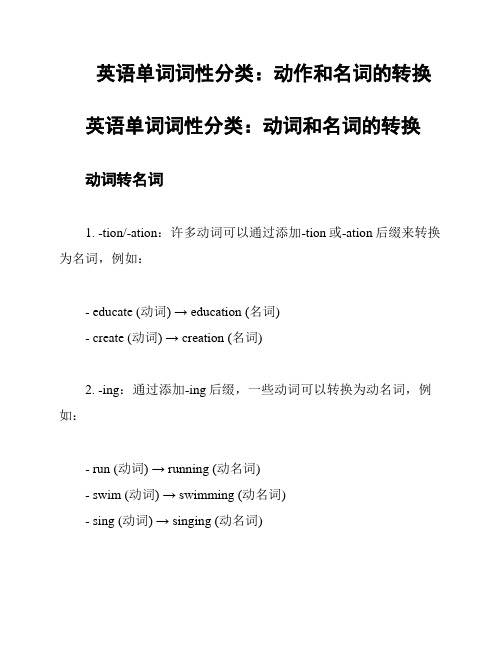
英语单词词性分类:动作和名词的转换英语单词词性分类:动词和名词的转换动词转名词1. -tion/-ation:许多动词可以通过添加-tion或-ation后缀来转换为名词,例如:- educate (动词) → education (名词)- create (动词) → creation (名词)2. -ing:通过添加-ing后缀,一些动词可以转换为动名词,例如:- run (动词) → running (动名词)- swim (动词) → swimming (动名词)- sing (动词) → singing (动名词)3. 不规则变化:还有一些动词转换成名词时存在不规则的变化,例如:- lose (动词) → loss (名词)- win (动词) → win (名词)- teach (动词) → teaching (名词)名词转动词1. -ize/-ise:通过添加-ize或-ise后缀,一些名词可以转换为动词,例如:- globalization (名词) → globalize (动词)- organization (名词) → organize (动词)- realization (名词) → realize (动词)2. 形容词转动词:一些名词也可以通过添加动词to be的形式来转换为动词,例如:- success (名词) → succeed (动词)- failure (名词) → fail (动词)- change (名词) → change (动词)3. 不规则变化:还有一些名词转换成动词时存在不规则的变化,例如:- child (名词) → child (动词)- water (名词) → wa ter (动词)- dog (名词) → dog (动词)以上是英语单词词性分类中,动词和名词的转换方式的简要介绍。
希望对您学习英语有所帮助!。
英语词性转换归纳

动词变名词1.v+ ment 结尾achieve---achievement 成就advertise--- advertisement// advertisingagree— (in )agreementapartment 公寓amusement 娱乐argue---argument争吵commit奉献—commitmentcompliment 称赞,恭维develop---developmentdisgree—disagreementdepartment 局,部experiment 实验,试验equip 装备---equipment 装备,器材govern 统治—government 政府manage---management 经营管理2.V+ tion 结尾attract吸引—attraction 有吸引力的事或人;令人向往的地方conclude—conclusion 结论compete—competition 竞争,比赛discuss—discussion 讨论educate-----educationdecide----decisiondescribe—description描写,描绘express 表达----expression 词语;表达方式graduate 毕业—graduationoperate 操作,动手术—operationorganize----organization instruct—instruction 指导,介绍invent—inventor / invention invite—invitationinspire---inspiration 灵感,鼓舞人心的--- pollute----pollution 污染predict---prediction 预言pronounce ---pronunciationresolve 决心-----resolution 决心permit 允许-----permissionsuggest-建议,暗示--suggestionsolve解决-----solution 解决方法3.V+ ance 结尾appear—appearance 外貌,出现perform----performance 演出4.V+ ing 结尾bathe 洗澡---bathingend 结束----ending 结尾,结局train 训练---trainingmean ---- meaning 意义say-----saying 谚语5.V+ 其他Beg(乞讨)—beggar 乞丐behave 行为,举止----behaviorknow---knowledgefly—flight 飞行heat 加热---heat 热量hit 撞击------hit 轰动一时的人或物,碰撞mix 混合-----mixture 混合物press 按,压—pressure 压力sit-----seat 座位succeed-- successtour 在-----旅游,在-----作巡回演出直接+地点 tour China ---tour 旅游/ tourist 游客名词变形容词1.名词+yAnger 生气-----angryhunger---hungryfog—foggy有雾的fur----furry 毛皮的guilt 罪恶---guilty 内疚的health---healthyluck---luckycloud---cloudywind—windyrain---rainysnow---snowysun—sunnytourist------touristy 游客多的business---busysalt 盐--- salty 咸的shine---shiny 发亮的silk 丝绸—silky 丝绸般的sleep---sleepy 昏昏欲睡的taste 口味,品味------tasty 甜的2.名词+ edbalance –balanced 平衡的spot 斑点,地点----spotted 有斑点的talent-----talented 有天赋的organized 有组织的distusted 厌恶的offended 生气的crowded 拥挤的polluted 被污染的pleased 高兴的3.名词+ ful/less meaning—meaningful 有意义的care—careful/ careless 小心的;粗心的help---helpful / helpless home—homeless 无家可归的colour---colourfulpain 疼痛---painful 痛苦的use---useless/ usefulthank—thankful 充满感激的peace 和平 ---- peaceful 平静的,宁静的playful 顽皮的,爱玩耍的4.名词+ ableadjustable 可调整的comfort---comfortableknowledge---knowledgeablesuit 一套-----suitable 合适的5.名词+ ousenormous 巨大的danger—dangerousmystery 神秘-----mysterious 神秘的6.ce 变 tconfidence----confidentdifference---different7. al 结尾medicine 药----medical 医学的music---musicalnature---natural 自然的person---personal (私人的) nation—national 国家的education---educational有教育意义的tradition----traditional 传统的origin起源---original 新颖的;独创的8.名词+ lyfriend—friendlylive---lively 活跃的,有生气的love—lovely 可爱的9.+ en 结尾wood—wooden 木制的wool—woolen 羊毛的10. 其他energy精力---energeticfool 傻子—foolish 愚蠢的freedom 自由—free 空的,免费的height 高度—highillness 疾病--- ill love—loving 慈爱的death---deadpleasure---pleasant / pleased popularity 流行性—popular pride---proudscientist----scientific 科学的方位的词表达名词—形容词East—easternWest—westernSouth—southernNorth---northernIn the west of ChinaIn the western part of China四大洲名词-----形容词Asia 亚洲–---- AsianAfrica 非洲----- African Europe欧洲----- European America 美洲-----American形容词变副词1.形容词+ lybad—badlybright—brightly 明亮地casual—casually 随意地clear—clearly 清楚地complete—completely 完全correct---correctly 正确地final--finallyfortunate—fortunately幸运地general—generally 一般来讲loud—loudlyparticular 特殊的,独特的—particularly polite—politelyproper 合适的-,恰当的---properlymain------mainly 主要地most 多数-----mostly 多半,大多数normal---normally 正常地quick—quicklyquiet—quietly 轻轻地,安静地real—reallyrecent 最近的----recently 最近;近来hard 难的;努力地---hardly 几乎不late 迟的—lately 最近;近来sad--sadlyslow---slowlyspecial—specially 专门,特殊地specific---specifically 特定地,明确地strong—strongly 坚决地,强烈地sudden—suddenly突然usual—usually2. 以le 结尾的去e + ycomfortable---comfortablygentle—gentlypossible---possiblysimple ----simply 仅仅;只;简单地terrible---terribly3. 辅音字母+ y 变 ilyeasy—easilyheavy—heavilyhappy--happily4.特殊good—well好地 well 身体健康的,井true—truly名词---形容词—副词beauty 美,美人—beautiful—beautifully care—careful—carefully care—careless—carelesslydifference---different---differently happiness—happy—happily hunger—hungry--hungrily health—healthy—healthily luck—lucky—luckily noise—noisy—noisily pride—proud—proudly骄傲地sadness—sad—sadlysafety 安全;安全的地方—safe—safely silence—silent---silently 默默地success—successful—successfully truth—true—truly unluck—unlucky—unluckilywonder 奇迹—wonderful—wonderfully既是形容词又是副词early get up early ;an early trainlate be late for classcome late for schooldeep dive deep into the seaa hole deep largehigh jump high;a high mountainhard a hard question;a hard stone work hard / study hardrain hardlong It takes too longIt takes a long timefar jump farMy home is far from school straight a straight linego straight along here三 . 派生:指由一个词根加上前缀和(或)后缀构成另一个词的构词形式。
单词的词性转换技巧
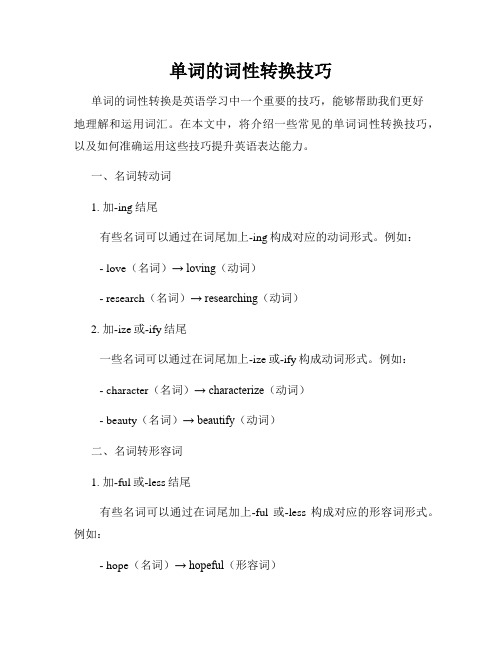
单词的词性转换技巧单词的词性转换是英语学习中一个重要的技巧,能够帮助我们更好地理解和运用词汇。
在本文中,将介绍一些常见的单词词性转换技巧,以及如何准确运用这些技巧提升英语表达能力。
一、名词转动词1. 加-ing结尾有些名词可以通过在词尾加上-ing构成对应的动词形式。
例如:- love(名词)→ loving(动词)- research(名词)→ researching(动词)2. 加-ize或-ify结尾一些名词可以通过在词尾加上-ize或-ify构成动词形式。
例如:- character(名词)→ characterize(动词)- beauty(名词)→ beautify(动词)二、名词转形容词1. 加-ful或-less结尾有些名词可以通过在词尾加上-ful或-less构成对应的形容词形式。
例如:- hope(名词)→ hopeful(形容词)- help(名词)→ helpless(形容词)2. 加-al或-ic结尾一些名词可以通过在词尾加上-al或-ic构成形容词形式。
例如:- music(名词)→ musical(形容词)- humor(名词)→ humorous(形容词)三、动词转名词1. 加-er或-or结尾有些动词可以通过在词尾加上-er或-or构成对应的名词形式。
例如:- teach(动词)→ teacher(名词)- act(动词)→ actor(名词)2. 加-ing结尾一些动词可以通过在词尾加上-ing构成名词形式。
例如:- sing(动词)→ singing(名词)- dance(动词)→ dancing(名词)四、形容词转副词1. 直接加-ly结尾大多数形容词可以直接在词尾加上-ly构成对应的副词形式。
例如:- quick(形容词)→ quickly(副词)- careful(形容词)→ carefully(副词)2. 改变部分拼写一些形容词需要改变部分拼写来构成副词形式。
英语形容词-名词-动词-副词-互变方法规律
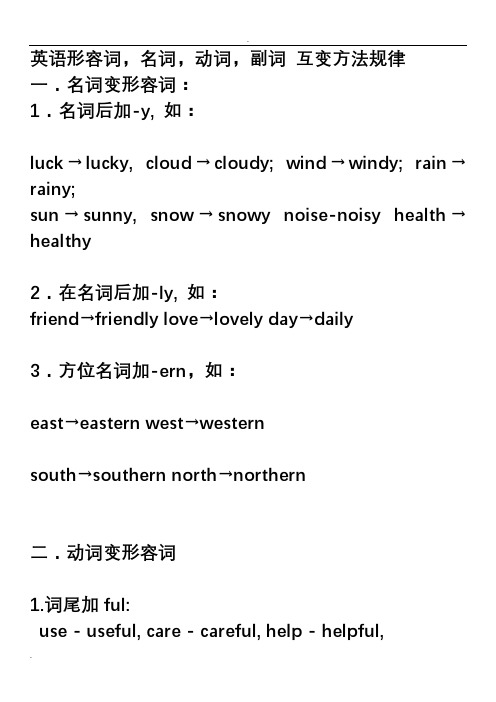
英语形容词,名词,动词,副词互变方法规律一.名词变形容词:1.名词后加-y, 如:luck→lucky, cloud→cloudy; wind→windy; rain→rainy;sun→sunny, snow→snowy noise-noisy health→healthy2.在名词后加-ly, 如:friend→friendly love→lovely day→daily3.方位名词加-ern,如:east→eastern west→westernsouth→southern north→northern二.动词变形容词1.词尾加ful:use - useful, care - careful, help - helpful,thank - thankful peace - peaceful,forget - forgetful, play - playful,succeed - successful, wonder - wonderful2.词尾加d或ed:please - pleased, unite - united, excite - excited,surprise - surprised, organize - organized, close - closed,wound - wounded, relax - relaxed,develop - developed,appreciate - appreciated,frustrate - frustrated, interest - interested, annoy - annoyed, use - used,frighten - frightened, crowd - crowded, thrill - thrilled,pollute - polluted3.词尾加ing:interest - interesting,surprise - surprising,excite - excitingdevelop - developing,frighten - frightening,thrill - thyrillingfrustrate - frustrating,relax _ relaxing,live - livingrock - rocking,sleep - sleeping4.词尾变y为i,加ed:worry - worried, marry - married,fry - fried, terrify - terrified satisfy - satisfied5.词尾加able:know - knowledgeable, enjoy - enjoyabe,suit - suitable,adjust - adjustable, comfort - comfortable6.其它:lose - lost, fool - foolish, live - livelysleep - sleepy / sleeping / asleep,wake - awake, taste - tastyspeak - spoken, break - broken, die - dead, educate - aducational,world - worldwide三.形容词变副词规律小结例词1.大部分形容词加lycareless----carelesslyquiet----quietlydifferent----differently2.以le结尾的形容词变le为ly possible----possiblyterrible----terriblycomfortable----comfortably gentle----gentlysimple----simply3.以y结尾的形容词变y为ilyeasy----easilyangry----angrilynoisy----noisilyhappy----happilyheavy----heavilyhealthy----healthily不规则变化本身既是形容词也是副词,无需改变fast----fastearly----earlyhigh----highhard----hardlate----latefar----farwide----widealone----alone形容词和副词为完全不同的单词good----well需要去掉字母e的单词true----trulygentle----gentlyterrible----terribly虽然以ly结尾,但却是形容词,不能直接用来修饰动词friendlylivelylovelylonelyLikely有些形容词本身即为副词,同时也有加ly的副词形式。
英语动词名词形容词变化规律
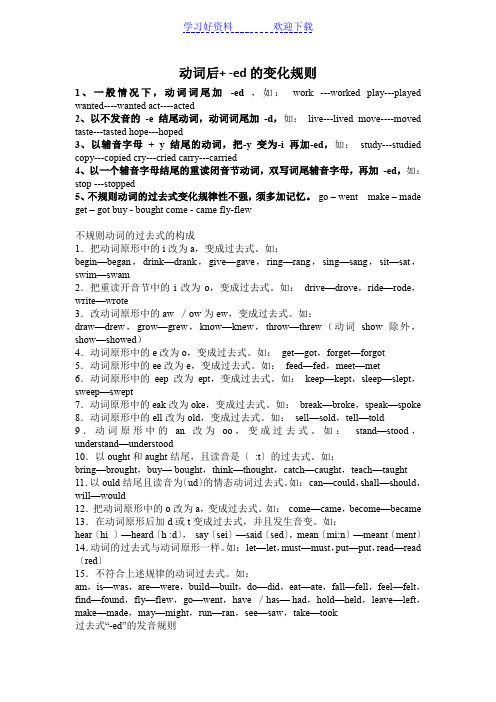
动词后+ -ed的变化规则1、一般情况下,动词词尾加-ed,如:work ---worked play---played wanted----wanted act----acted2、以不发音的-e 结尾动词,动词词尾加-d,如:live---lived move----moved taste---tasted hope---hoped3、以辅音字母+ y结尾的动词,把-y变为-i 再加-ed,如:study---studied copy---copied cry---cried carry---carried4、以一个辅音字母结尾的重读闭音节动词,双写词尾辅音字母,再加-ed,如:stop ---stopped5、不规则动词的过去式变化规律性不强,须多加记忆。
go – went make – made get – got buy - bought come - came fly-flew不规则动词的过去式的构成1.把动词原形中的i改为a,变成过去式。
如:begin—began,drink—drank,give—gave,ring—rang,sing—sang,sit—sat,swim—swam2.把重读开音节中的i改为o,变成过去式。
如:drive—drove,ride—rode,write—wrote3.改动词原形中的aw /ow为ew,变成过去式。
如:draw—drew,grow—grew,know—knew,throw—threw(动词show除外,show—showed)4.动词原形中的e改为o,变成过去式。
如:get—got,forget—forgot5.动词原形中的ee改为e,变成过去式。
如:feed—fed,meet—met6.动词原形中的eep改为ept,变成过去式。
如:keep—kept,sleep—slept,sweep—swept7.动词原形中的eak改为oke,变成过去式。
英语单词词性转换

英语单词词性转换一、动词v.→名词n.1、词尾加上-er或-or之后就变成了表示"某一类人"的名词例如:work—worker, teach—teacher, sing—singer,jump—jumper, play—player, learn—learner,visit—visitor, invent—inventor,collect—collector等.注意:1以不发音的e结尾的动词,在词尾加-r.例如:drive—driver, write—writer等.2以辅音字母开头并以元音字母加辅音字母结尾的单词,应双写末尾的辅音字母再加er; 例如:run—runner, win—winner,begin—beginner等.2.在动词词尾加上-ment 变成名词例如:achieve—achievement 成就advertise—advertisement例如:argue—argument争论3.在动词词尾加上-tion/sion变成名词例如: attract—attraction; instruct—instruction;invent—invention discuss—discussion;express—expression educate—education;graduate—graduation; operate—operation 去e再加"ion"compete—competition; organize—organization 把e改成其他字母再加"tion"decide—decision conclude—conclusion 把de改为s再加"ion"describe—description描写,描绘这是特例,不规则变化4.在动词词尾加上-ance变成名词例如: appear—appearance 外貌;出现perform—performance 演出accept—acceptance 接受resist-resistance n.抵抗,阻力5.在动词词尾加-ing变成名词方法与动词变为现在分词的方法相同例如:meet—meeting build—building wait—waitingbathe—bathing say—saying谚语 mean—meaning注意:以辅音字母开头并以元音字母加辅音字母结尾的单词,应双写末尾的辅音字母再加-ing 如:swim—swimming shop—shopping begin—beginning二、动词v.→形容词adj.1.动词后面加able,以e结尾的动词则去e加able,表示具有此性质,特点或属性.例如: afford-affordable;love-lovable2.动词后面加ed,以e结尾的动词则直接加d,表示被动性的属性或特点.例如: scatter-scattered use-used3不规则的动词则必须记忆,记住其过去分词形式.规律不大,意义同b.三.名词n.→形容词adj.1.在名词后面加-y可以变成形容词尤其是一些与天气有关的名词例如: rain—rainy, cloud—cloudy, wind—windy, snow—snowy,health—healthy, luck—lucky,anger—angry guilt—guilty内疚的tourist—touristy游客多的 , salt 盐—salty 咸的silk丝绸—silky丝绸般的, sleep—sleepy 昏昏欲睡的注意:1如果以辅音字母开头并以元音字母加辅音字母结尾,这时应双写辅音字母再加"-y".如: sun—sunny, fun—funny, fog—foggy有雾的, fur—furry毛皮的2少数以不发音的e结尾的名词变为形容词时,应去掉e再加"-y".如: noise—noisy, ice—icy, shine—shiny发亮的, taste口味—tasty甜的2.名词后面加-ed,以e结尾的直接加d.例如: spot斑点—spotted有斑点的; talent—talented 有天赋的organize—organized 有组织的; balance—balanced平衡的3.一些抽象名词在词尾加-ful可以变为形容词例如:care—careful, thank—thankful, help—helpful,use—useful, meaning—meaningful4.在名词后加-less构成含有否定意义的形容词例如:care—careless粗心的, use—useless无用的hope—hopeless没希望的,home—homeless无家可归的5.一些以-ce结尾的名词,把-ce改为-t变成形容词例如: difference—different, silence—silent, confidence—confident 6.在名词后加-ly变为形容词例如: friend—friendly, love—lovely, live---lively7.在名词后加-ous变为形容词例如: danger—dangerous prosperous a 繁荣的pro 在前+sper 希望+ous 8.名词后面加-al变为形容词例如: music—musical; medicine—medical 这个比较特殊9名词后面加-able变为形容词,如果以e结尾就去e再加"-able".例如: adjust—adjustable 可调整的 value—valuable有价值的10.名词后面加-en变成形容词例如: wood—wooden 木制的 wool—woolen 羊毛的四.形容词adj.→副词adv.▲一般在形容词的词尾加-ly可以变成副词例如: quick—quickly, slow—slowly, loud—loudly, sudden—suddenly 等例如:possible—possibly, terrible—terribly。
英语词性转换规则大全
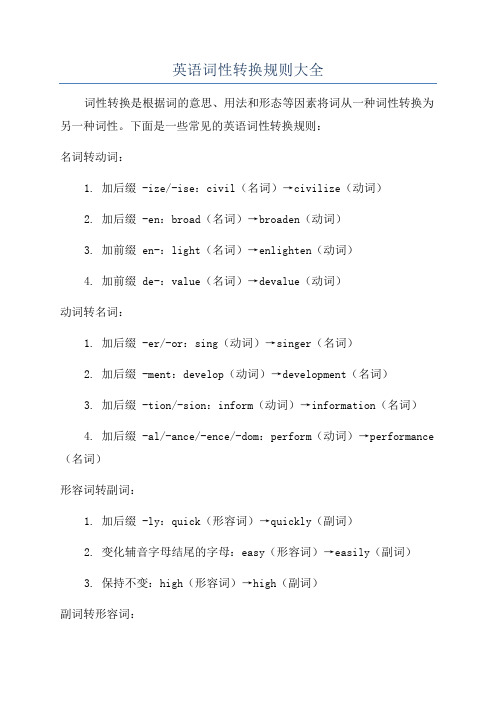
英语词性转换规则大全
词性转换是根据词的意思、用法和形态等因素将词从一种词性转换为另一种词性。
下面是一些常见的英语词性转换规则:
名词转动词:
1. 加后缀 -ize/-ise:civil(名词)→civilize(动词)
2. 加后缀 -en:broad(名词)→broaden(动词)
3. 加前缀 en-:light(名词)→enlighten(动词)
4. 加前缀 de-:value(名词)→devalue(动词)
动词转名词:
1. 加后缀 -er/-or:sing(动词)→singer(名词)
2. 加后缀 -ment:develop(动词)→development(名词)
3. 加后缀 -tion/-sion:inform(动词)→information(名词)
4. 加后缀 -al/-ance/-ence/-dom:perform(动词)→performance (名词)
形容词转副词:
1. 加后缀 -ly:quick(形容词)→quickly(副词)
2. 变化辅音字母结尾的字母:easy(形容词)→easily(副词)
3. 保持不变:high(形容词)→high(副词)
副词转形容词:
1. 去掉后缀 -ly并加后缀 -al:actively(副词)→active(形容词)
2. 去掉后缀 -ly并加后缀 -y:quickly(副词)→quick(形容词)动词转副词:
1. 加后缀 -ly:slow(动词)→slowly(副词)
2. 保持不变:run(动词)→run(副词)
以上是一些常见的英语词性转换规则,但并不是所有词都能完全按照
这些规则进行转换,还需根据具体情况灵活运用。
英语形容词,名词,动词,副词互变方法规律

英语形容词,名词,动词,副词互变方法规律一.名词变形容词:1 .名词后加-y,如:luck^ lucky, cloud k cloudy; wind R windy; rain^ rainy; sun^ sunny, snow> snowy noise-noisy healt R healthy2. 在名词后加-ly,如:friend^ friendly love R lovely day R daily3. 方位名词加-ern,如:east R eastern wes R westernsouth R southern north R northern二.动词变形容词1.词尾加ful:use - useful, care - careful, help - helpful, thank - thankful peace - peaceful, forget - forgetful, play - playful,succeed - successful, wonder - wonderful2.词尾加d或ed:please - pleased, unite - united, excite - excited, surprise - surprised, organize - organized, close - closed, wound - wounded, relax - relaxed,develop - developed, appreciate - appreciated,frustrate - frustrated, interest - interested, annoy - annoyed, use - used, frighten - frightened, crowd - crowded, thrill - thrilled, pollute - polluted3■词尾加ing:interest - interesting,surprise - surprising,excite - excitingdevelop - developing,frighten - frightening,thrill - thyrillingfrustrate - frustrating,relax _ relaxing,live - livingrock - rocking,sleep - sleeping4.词尾变y为i,加ed:worry - worried, marry - married,fry - fried, terrify - terrified satisfy - satisfied5■词尾加able:know - knowledgeable, enjoy - enjoyabe,suit - suitable adjust - adjustable, comfort - comfortable6.其它: lose - lost, fool - foolish, live - livelysleep - sleepy / sleeping / asleep,wake - awake, taste -tastyspeak - spoken, break - broken, die - dead, educate - aducational,world - worldwide三.形容词变副词规律小结例词1. 大部分形容词加lycareless----carelesslyquiet----quietlydifferent----differently2. 以le结尾的形容词变le为lypossible——possiblyterrible-■■-terribly comfortable-■■-comfortably gentle——gently simple-■■-simply3.以y结尾的形容词变y为ilyeasy-■■-easily angry----angrily noisy----noisily happy——happily heavy----heavily healthy----healthily 不规则变化本身既是形容词也是副词,无需改变fast・・・・fastearly----early high----high hard----hard late----late far----far wide----wide alone----alone 形容词和副词为完全不同的单词good-■■-well需要去掉字母e的单词true-■■-trulygentle——gentlyterrible-■■-terribly虽然以ly结尾,但却是形容词,不能直接用来修饰动词friendly lively lovely lonely Likely有些形容词本身即为副词,同时也有加ly的副词形式。
英语单词词性转换方法法
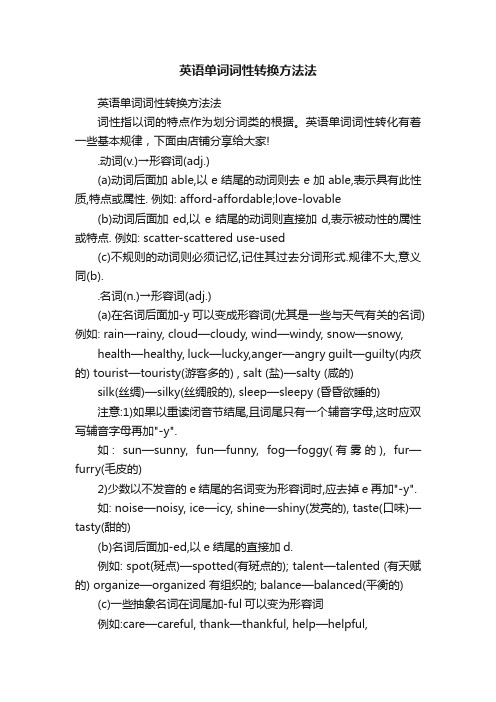
英语单词词性转换方法法英语单词词性转换方法法词性指以词的特点作为划分词类的根据。
英语单词词性转化有着一些基本规律,下面由店铺分享给大家!.动词(v.)→形容词(adj.)(a)动词后面加able,以e结尾的动词则去e加able,表示具有此性质,特点或属性. 例如: afford-affordable;love-lovable(b)动词后面加ed,以e结尾的动词则直接加d,表示被动性的属性或特点. 例如: scatter-scattered use-used(c)不规则的动词则必须记忆,记住其过去分词形式.规律不大,意义同(b)..名词(n.)→形容词(adj.)(a)在名词后面加-y可以变成形容词(尤其是一些与天气有关的名词) 例如: rain—rainy, cloud—cloudy, wind—windy, snow—snowy, health—healthy, luck—lucky,anger—angry guilt—guilty(内疚的) tourist—touristy(游客多的) , salt (盐)—salty (咸的)silk(丝绸)—silky(丝绸般的), sleep—sleepy (昏昏欲睡的)注意:1)如果以重读闭音节结尾,且词尾只有一个辅音字母,这时应双写辅音字母再加"-y".如: sun—sunny, fun—funny, fog—foggy(有雾的), fur—furry(毛皮的)2)少数以不发音的e结尾的名词变为形容词时,应去掉e再加"-y".如: noise—noisy, ice—icy, shine—shiny(发亮的), taste(口味)—tasty(甜的)(b)名词后面加-ed,以e结尾的直接加d.例如: spot(斑点)—spotted(有斑点的); talent—talented (有天赋的) organize—organized 有组织的; balance—balanced(平衡的)(c)一些抽象名词在词尾加-ful可以变为形容词例如:care—careful, thank—thankful, help—helpful,use—useful, meaning—meaningful(d)在名词后加-less构成含有否定意义的形容词例如:care—careless(粗心的), use—useless(无用的)hope—hopeless(没希望的),home—homeless(无家可归的)(e)一些以-ce结尾的名词,把-ce改为-t变成形容词例如: difference—different, silence—silent, confidence—confident(f).在名词后加-ly变为形容词例如: friend—friendly, love—lovely, live---lively(g).在名词后加-ous变为形容词例如: danger—dangerous(h)名词后面加-al变为形容词例如: music—musical; medicine—medical (这个比较特殊)(i)名词后面加-able变为形容词,如果以e结尾就去e再加"-able". 例如: adjust—adjustable 可调整的. value—valuable有价值的(j)名词后面加-en变成形容词例如: wood—wooden 木制的 wool—woolen 羊毛的.动词(v.)→名词(n.)(a)词形不变,词性改变例如:work, study, water, plant等可以用作动词(工作,学习,浇水,种植),也可以用作名词(工作,学习,水,植物).(b)一些动词在词尾加上-er或-or之后就变成了表示"某一类人"的名词例如:work—worker, teach—teacher, sing—singer,jump—jumper, play—player, learn—learner,visit—visitor, invent—inventor,collect—collector等.注意:1)以不发音的e结尾的动词,在词尾加-r.例如:drive—driver, write—writer等.2)以重读闭音节结尾,且末尾只有一个辅音字母的动词,应双写末尾的辅音字母,再加-er例如:run—runner, win—winner,begin—beginner等.(c)在动词词尾加上-ment 变成名词例如:achieve—achievement (成就)advertise—advertisement//advertising(广告)agree—agreement disgree—disagreementamuse—amusement (娱乐) improve—improvement(争吵)commit(奉献)—commitment develop—development (发展) depart—department (局,部) govern(统治)—government(政府) manage—management (管理) equip—equipment (装备)有些单词比较特殊,需把动词后的e去掉再加ment.例如:argue—argument(争论)(d)在动词词尾加上-(t)ion/(s)ion变成名词例如: attract—attraction; instruct—instruction;invent—invention discuss—discussion;express—expression educate—education;graduate—graduation; operate—operation (去e再加"ion") compete—competition; organize—organization (把e改成其他字母再加"tion") decide—decision conclude—conclusion (把de 改为s再加"ion")describe—description描写,描绘 (这是特例,不规则变化)(e)在动词词尾加上-ance变成名词例如: appear—appearance (外貌;出现)perform—performance (演出)accept—acceptance (接受)(f)在动词词尾加-ing变成名词 (方法与动词变为现在分词的方法相同)例如:meet—meeting build—building wait—waiting bathe—bathing say—saying(谚语) mean—meaningend —ending train —training wash—washing 注意:以重读闭音节结尾,且末尾只有一个辅音字母的动词,应双写末尾的辅音字母,再加-ing如:swim—swimming shop—shopping begin—beginning(g)其他一些比较特殊的变化例如: Beg(乞讨)—beggar(乞丐) behave(行为举止)—behavior know(知道)—knowledge(知识) fly—flight (飞行)heat (加热)—heat(热量) hit (撞击)—hit( 轰动一时的人或物,碰撞) mix (混合)—mixture(混合物) press(按,压)—pressure(压力) sit(坐)—seat (座位) succeed—success(成功)tour—tour(旅游)/ tourist (游客)形容词→副词一般在形容词的词尾加-ly可以变成副词。
动词、名词、形容词、副词的相互转化

一、名词变为形容词的方法1. 在名词后面加—y可以变成形容词(尤其是一些与天气有关的名词)。
例如:rain—rainy, cloud —cloudy, wind—windy, snow-snowy, health—healthy, luck—lucky等.注意:1)如果名词以重读闭音节结尾,且词尾只有一个辅音字母,这时应双写词尾的辅音字母再加-y。
如:sun—sunny, fun-funny等.2)少数以不发音的e结尾的名词变为形容词时,应去掉e再加-y。
例如:noise—noisy, ice —icy 等。
2. 一些抽象名词在词尾加-ful可以变为形容词.例如:care—careful, thank-thankful, help—helpful, use—useful, beauty—beautiful等.3。
一些表示国家的名词可以在词尾加—ese, -ish或—n构成表示国籍、语言的形容词.例如:China—Chinese, Japan—Japanese, England—English, America—American, India—Indian, Australia —Australian(注意Canada-Canadian)。
4。
在名词后加—ous变为形容词.例如:danger—dangerous等。
5. 在名词后加—ly变为形容词。
例如:friend—friendly, love—lovely 等。
6.在名词后加-less构成含有否定意义的形容词。
例如:care—careless(粗心的),use—useless(无用的),hope—hopeless(没希望的),home—homeless(无家可归的)等。
7。
一些以-ence结尾的名词,把ence改为ent变成形容词.例如:difference—different, silence—silent 等。
二、动词变为名词的方法1.词形不变,词性改变。
英语单词词性转换规则
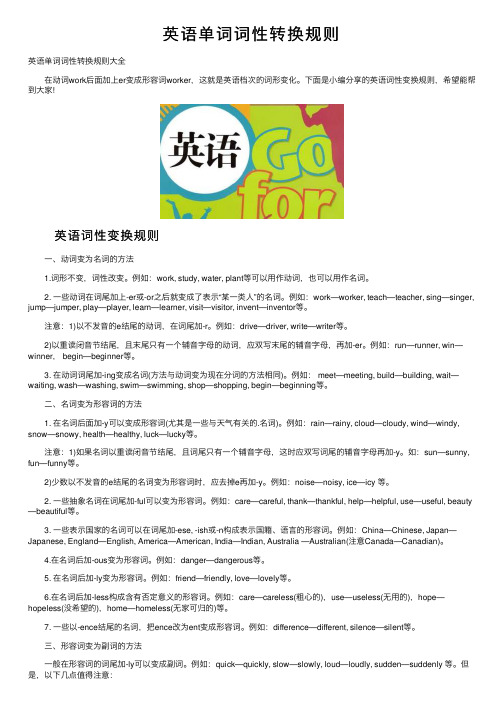
英语单词词性转换规则英语单词词性转换规则⼤全 在动词work后⾯加上er变成形容词worker,这就是英语档次的词形变化。
下⾯是⼩编分享的英语词性变换规则,希望能帮到⼤家! 英语词性变换规则 ⼀、动词变为名词的⽅法 1.词形不变,词性改变。
例如:work, study, water, plant等可以⽤作动词,也可以⽤作名词。
2. ⼀些动词在词尾加上-er或-or之后就变成了表⽰“某⼀类⼈”的名词。
例如:work—worker, teach—teacher, sing—singer, jump—jumper, play—player, learn—learner, visit—visitor, invent—inventor等。
注意:1)以不发⾳的e结尾的动词,在词尾加-r。
例如:drive—driver, write—writer等。
2)以重读闭⾳节结尾,且末尾只有⼀个辅⾳字母的动词,应双写末尾的辅⾳字母,再加-er。
例如:run—runner, win—winner, begin—beginner等。
3. 在动词词尾加-ing变成名词(⽅法与动词变为现在分词的⽅法相同)。
例如: meet—meeting, build—building, wait—waiting, wash—washing, swim—swimming, shop—shopping, begin—beginning等。
⼆、名词变为形容词的⽅法 1. 在名词后⾯加-y可以变成形容词(尤其是⼀些与天⽓有关的.名词)。
例如:rain—rainy, cloud—cloudy, wind—windy, snow—snowy, health—healthy, luck—lucky等。
注意:1)如果名词以重读闭⾳节结尾,且词尾只有⼀个辅⾳字母,这时应双写词尾的辅⾳字母再加-y。
如:sun—sunny, fun—funny等。
2)少数以不发⾳的e结尾的名词变为形容词时,应去掉e再加-y。
英语形容词,名词,动词,副词 互变方法规律

英语形容词,名词,动词,副词互变方法规律一.名词变形容词:1.名词后加-y, 如:luck→lucky, cloud→cloudy; wind→windy; rain→rainy; sun→sunny, snow→snowy noise-noisy health→healthy2.在名词后加-ly, 如:friend→friendly love→lovely day→daily3.方位名词加-ern,如:east→eastern west→westernsouth→southern north→northern二.动词变形容词1.词尾加ful:use - useful, care - careful, help - helpful,thank - thankful peace - peaceful,forget - forgetful, play - playful,succeed - successful, wonder - wonderful2.词尾加d或ed:please - pleased, unite - united, excite - excited, surprise - surprised, organize - organized, close - closed, wound - wounded, relax - relaxed,develop - developed, appreciate - appreciated,frustrate - frustrated, interest - interested, annoy - annoyed, use - used, frighten - frightened, crowd - crowded, thrill - thrilled, pollute - polluted3.词尾加ing:interest - interesting,surprise - surprising,excite - excitingdevelop - developing,frighten - frightening,thrill - thyrillingfrustrate - frustrating,relax _ relaxing,live - livingrock - rocking,sleep - sleeping4.词尾变y为i,加ed:worry - worried, marry - married,fry - fried, terrify - terrified satisfy - satisfied5.词尾加able:know - knowledgeable, enjoy - enjoyabe,suit - suitable,adjust - adjustable, comfort - comfortable6.其它:lose - lost, fool - foolish, live - livelysleep - sleepy / sleeping / asleep,wake - awake, taste - tastyspeak - spoken, break - broken, die - dead, educate - aducational,world - worldwide三.形容词变副词规律小结例词1.大部分形容词加lycareless----carelesslyquiet----quietlydifferent----differently2.以le结尾的形容词变le为lypossible----possiblyterrible----terriblycomfortable----comfortablygentle----gently3.以y结尾的形容词变y为ilyeasy----easilyangry----angrilynoisy----noisilyhappy----happilyheavy----heavilyhealthy----healthily不规则变化本身既是形容词也是副词,无需改变fast----fastearly----earlyhigh----highhard----hardlate----latefar----farwide----widealone----alone形容词和副词为完全不同的单词good----well需要去掉字母e的单词true----trulygentle----gently虽然以ly结尾,但却是形容词,不能直接用来修饰动词friendlylivelylovelylonelyLikely有些形容词本身即为副词,同时也有加ly的副词形式。
英语词性转换七大规则表
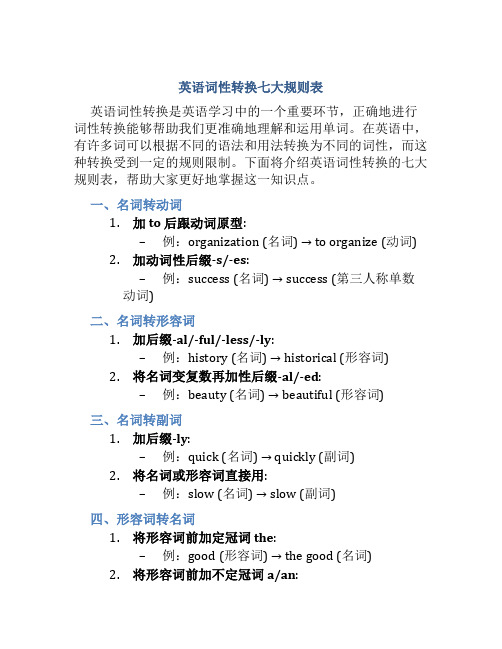
英语词性转换七大规则表英语词性转换是英语学习中的一个重要环节,正确地进行词性转换能够帮助我们更准确地理解和运用单词。
在英语中,有许多词可以根据不同的语法和用法转换为不同的词性,而这种转换受到一定的规则限制。
下面将介绍英语词性转换的七大规则表,帮助大家更好地掌握这一知识点。
一、名词转动词1.加 to 后跟动词原型:–例:organization (名词) → to organize (动词)2.加动词性后缀-s/-es:–例:success (名词) → success (第三人称单数动词)二、名词转形容词1.加后缀-al/-ful/-less/-ly:–例:history (名词) → historical (形容词)2.将名词变复数再加性后缀-al/-ed:–例:beauty (名词) → beautiful (形容词)三、名词转副词1.加后缀-ly:–例:quick (名词) → quickly (副词)2.将名词或形容词直接用:–例:slow (名词) → slow (副词)四、形容词转名词1.将形容词前加定冠词 the:–例:good (形容词) → the good (名词)2.将形容词前加不定冠词 a/an:–例:beautiful (形容词) → a beauty (名词)五、形容词转动词1.将形容词前加连系动词be:–例:easy (形容词) → are easy (动词)2.将形容词前加非谓语动词to:–例:important (形容词) → to important (动词)六、形容词转副词1.加后缀-ly:–例:quick (形容词) → quickly (副词)2.保持原貌:–例:fast (形容词) → fast (副词)七、副词转形容词1.去掉-ly加后缀-al:–例:naturally (副词) → natural (形容词)2.通过加more/less来表示不同级别的比较:–例:softly (副词) → less softly (形容词)以上是英语词性转换的七大规则表,通过掌握这些规则,我们可以更好地理解单词之间的转换关系,从而提升英语学习的效率和准确性。
英语词性转换大全 动词变名词、动词变形容词
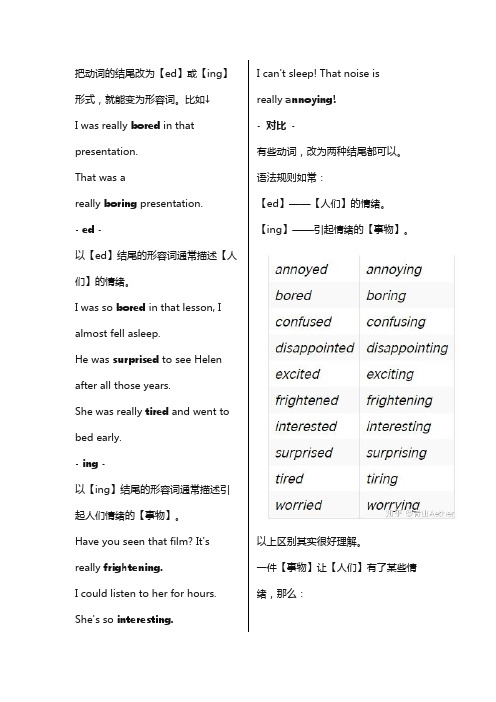
把动词的结尾改为【ed 】或【ing 】形式,就能变为形容词。
比如↓ I was really bored in that presentation. That was areally boring presentation. - ed -以【ed 】结尾的形容词通常描述【人们】的情绪。
I was so bored in that lesson, I almost fell asleep.He was surprised to see Helen after all those years.She was really tired and went tobed early. - ing -以【ing 】结尾的形容词通常描述引起人们情绪的【事物】。
Have you seen that film? It's really frightening.I could listen to her for hours. She's so interesting.I can't sleep! That noise is really annoying! - 对比 -有些动词,改为两种结尾都可以。
语法规则如常:【ed 】——【人们】的情绪。
【ing 】——引起情绪的【事物】。
以上区别其实很好理解。
一件【事物】让【人们】有了某些情绪,那么:【事物】是主动方,用【ing】结尾;【人们】是被动方,用【ed】结尾。
动词变名词1.v+ ment 结尾achieve ——achievement 成就advertise ——advertisement 广告agree ——agreement 同意amuse——amusement 娱乐commit ——commitment 奉献develop ——development 发展disagree ——disagreement 不赞同equip 装备——equipment 装备,器材govern 统治——government 政府manage——management 经营,管理argue ——argument 争吵2.V+ ion 结尾attract ——attraction 吸引discuss ——discussion 讨论express ——-expression 词语;表达instruct ——instruction 指导,介绍invent——invention 发明predict ——prediction 预言impress ——impression 印象suggest ——suggestion 建议,暗示educate ——education 教育graduate ——graduation 毕业operate ——operation 操作,动手术illustrate ——illustration 阐明,举例说明pollute ——pollution 污染introduce ——introduction 介绍organize ——organization组织imagine ——imagination 想象力inspire——inspiration 灵感,鼓舞人心的invite ——invitation 邀请compete ——competition 竞争,比赛pronounce ——pronunciation发音admit ——admission 承认permit ——permission 允许conclude ——conclusion 结论decide ——decision 决定describe ——description描写,描绘resolve ——resolution 决心solve ——solution 解决方法3.V+ ance 结尾allow ——allowance 允许appear ——appearance 外貌,出现perform ——performance 演出exist ——existance 存在4.V+ ing 结尾end ——ending 结尾,结局train ——training训练mean ——meaning 意义say——saying 谚语remind ——reminding提醒bathe ——bathing沐浴5.词尾加-er或-or后变成表示“某一类人”的名词work——worker 工人teach——teacher老师sing——singer 歌手jump——jumper跳高运动员play——player表演者、运动员learn——learner 学习者visit——visitor访问者invent——inventor发明家6.V+ 其他beg——beggar 乞丐sit——seat 座位believe ——belief 信仰behave ——behavior 行为know——knowledge 知识fly——flight 飞行mix ——mixture 混合物press ——pressure 压力serve ——service 服务succeed ——success 成功pursue ——pursuit 追求,从事propose ——proposal 建议withdraw ——withdrawal 取钱;收回;撤退survive ——survival--survivor 幸存者arrive ——arrival到达analyze ——analysis 分析2形容词变名词1.词尾ent改为ency或ence efficient有效率的——efficiency 效率patient——patience/impatience 耐性/无耐心dependent——dependence依赖性independent——independency 独立性urgent——urgency 紧急2.ble结尾,ble改为bility possible——possibility 可能responsible——responsibility 责任;职责3.其他accurate——accuracy 准确性prosperous——prosperity 繁荣true——truth 真相wide——width 宽度long——length 长度high——height 高度二、名词/动词变形容词1.名词+yhonest ——honesty 诚实的guilt 罪恶——guilty 内疚的health——healthy 健康的luck——lucky 幸运的cloud——cloudy 多云的wind—windy 多风的rain——rainy 多雨的snow——snowy 多雪的tourist ——touristy 游客多的er结尾,改er为ry hunger——hungry 饥饿的anger ——angry 生气的fog——foggy 有雾的sun——sunny 阳关灿烂的fur——furry 毛皮的shine——shiny 发亮的taste ——tasty 美味的2. 名词/动词+ ed以辅音+辅音结尾的单词,直接加ed talent ——talented 有天赋的offend ——offended 生气的crowd ——crowded 拥挤的以元音字母e结尾的单词直接加d balance ——balanced 平衡的organize——organized 有组织的pollute ——polluted 被污染的please ——pleased 高兴的元音加辅音结尾的单词,词尾辅音双写再加edspot ——spotted 有斑点的3.名词+ ful/lesscare ——careful/ careless 小心的/ 粗心的help——helpful / helpless 有帮助的/ 无助的use——useful/ useless有用的/ 无用的meaning ——meaningful / meaningless有意义的/无意义的colour——colourful /colourless 多彩的/无色的pain 疼痛——painful /painless痛苦的/ 不痛的thank——thankful / thankless 充满感激的/ 不知感恩的peace 和平——peaceful 和平的play游戏——playful 爱玩耍的home ——homeless 无家可归的4.名词/动词+ ablechange ——changeable 易变的adjust——adjustable 可调整的comfort——comfortable 舒适的knowledge——knowledgeable 知识渊博的suit ——suitable 合适的动词以辅音加y结尾把y变i 加able ,deny——deniable 可否认的rely——reliable 可靠的5.名词+ ous courage——courageous 勇敢的danger——dangerous 危险的以y结尾,改y为i再加ous mystery 神秘——mysterious 神秘的6.ce 变t confidence——confident 自信的difference——different 不同的dependence ——dependent 依赖他人的independence——independent 独立的7.词尾加al addition——additional 附加的,额外的music——musical 音乐的person——personal (私人的) nation——national 国家的education——educational有教育意义的tradition——traditional 传统的origin起源——original 新颖的;独创的以元音字母结尾的单词,去掉词尾元音加alnature——natural 自然的globe——global 全球的特例:class——classical 经典的medicine 药——medical 医学的grammar——grammatical 语法的8.名词+ ly friend——friendly 友好的live——lively 活跃的,有生气的love——lovely 可爱的week——weekly 每周的man——manly 男子气概的;强壮的9.词尾+ en wood——wooden 木制的wool——woolen 羊毛的10. 表示方位的词East——eastern West——western South——southern North——northern11.四大洲Asia 亚洲——AsianAfrica 非洲——African Europe欧洲——European America 美洲——American 12. 其他energy精力——energetic 精力充沛的strategy——strategic 战略的scientist——scientific 科学的fool 傻子——foolish 愚蠢的love——loving 慈爱的pleasure——pleasant令人愉快的/ pleased高兴的pride——proud 自豪的3形容词变动词1.词尾加ize modern——modernize 使...现代化social——socialize 使...社会化2.词尾加enfast——fasten 使固定;集中于short——shorten 缩短wide——widen 放宽less——lessen 使...减少特例(有变形):long——lengthen 使延长strong ——strengthen 加强;巩固3.词前加enlarge ——enlarge 扩大;放大4形容词变副词1.形容词+ ly bad——badly 坏地bright——brightly 明亮地casual——casually 随意地clear——clearly 清楚地complete——completely 完全correct——correctly 正确地final——finally 最后fortunate——fortunately幸运地general——generally 一般来讲loud——loudly 大声地particular ——particularly特别地polite——politely 礼貌地proper ——properly适当地main——mainly 主要地most ——mostly 多半,大多数normal——normally 正常地quick——quickly 迅速地quiet——quietly 轻轻地,安静地real——really 真正地recent ——recently 最近;近来sad——sadly 悲哀地slow——slowly 缓慢地special——specially 专门,特殊地specific——specifically 特定地,明确地strong——strongly 坚决地,强烈地sudden——suddenly突然usual——usually 通常2. 以le 结尾的,去e + y comfortable——comfortably 舒服地gentle——gently 温柔地possible——possibly 可能地simple——simply 仅仅;只;简单地terrible——terribly 非常;极度地3. 辅音字母+ y 变y为ily easy——easily 容易地heavy——heavily 沉重地happy——happily 快乐地4.特殊good——well好地true——truly 真实地。
词性转换

词性转换1.paint(动词/名词)—painter(名词)—painting(名词)2.thief(名词)—thieves(名词)3.alone(副/形)—lonely(形)4.safe(名/形)—save(动词)—safety(名词)—safely5.recent(形)—recently(副)6.true(形)—truth(名词)7.speak(动词)---speech(名词)---speakers(名词)8.help(动词/名词)—helpful(形)9.real(形)—really(副)—realize(动词)10.decide(动词)---decision(名词)11.health(名词)--healthy(形)---healthily(副)—unhealthy(形)—unhealthily(副)—healthier12.attract(动词)---attraction(名词)—attractive(形)13.electric kettles--electronic brains/ calculators---electricity(名词)14.depend on(动词)---independent(形)15.like(动词)---dislike(动词)16.mean—meaning(名词)17.change(动/名)—changeable(形)18.different(形)—difference(名词)19.collect(动词)—collection(名词)20.city(名词)---citizen(名词)21.wood(名词)---wooden(形)22.appear(动词)---disappear(动词)23.depart for(动词)---departure time---department store24.difficulty(名词)—difficult(形)25.wait(动词)—waiter(名词)—waitress(名词)26.enemy—enemies(名词)27.enter(动词)—entrance(名词)28.succeed(动词)--success (名词)—successful(形)—successful(副)y—laid—laid—laying(摆放,产卵)30.lie—lay—lain—lying(躺)31.please—pleasure(名词)—pleased(形)—pleasant(形)32.friend(名词)—friendly(形)33.wide(形)---widely(副)---widen(动词)34.alive(形)—living(名)35.sale—sell(动词)—sold—soldplete(形)—completely(副)37.invite(动词)—invitation(名词)38.custom—customer(名词)39.forget(动词)—forgetful(形)40.excited(形)—excitedly(副)—exciting(形)--excitement41.satisfy(动词)—satisfied(形)42.happy(形)—happiness(名词)—happily(副)—unhappy(形)—unhappily(副)43.ill(形)---illness(名词)44.enjoy(动词)—enjoyable(形)—enjoyment(名词)45.Weight(名词,体重)---weigh(动词,重)46.long(形容词,长)---length(名词,长度)47.high(形容词,高)---height(名词,长度)48.expensive(形)---expense(名词)49.kind(形)—kindness(名词)50.angry(形)--angrily(副词)51.need(动/名)---necessary(形)52.conclude(动词)---conclusion(名词)---jump to conclusions53.protect(动词)---protection(名词)54.family(名词)---be familiar with/to(形)55.final(形)---finally(副词)56.possible(形)---possibly(副词)---impossible57.run(动词)---runner(名词)58.free(形)---freely(副词)---freedom(名词)59.die(动词)---dead(形)---death(名词)60.freeze(动词)---frozen(形)---freezing(形)61.hot(形)---heat(名词)62.fun(不可数名词)---funny(形)--funnier--funniest63.invent(动词)---inventor(名词)---invention(名词)64.serve(动词)---service(名词)---servant(名词)65.physical change/exercise---physics homework/teacher/lab66.chemical change/symbol ---chemistry homework/teacher/lab67.wound(名词)---wounded(形)68.mix(动词)---mixture(名词)69.decide(动词)---decision(名词)70.two---second---secondary school,71.post—postage(名词)72.care(动/名)—careful(形)—carefully(副词)—careless(形)73.medicine(名词)—medical(形)74.honesty(名词)—honest(形)—dishonest(形)75.act(动词)—actor(名词)—actress(名词)—active(形)—activity(名词)win(动词)—winner(名词)76.own(动词)—owner(名词)77.sit(动词)—seat(名词)78.easy(形)—easily(副词)79.science(名词)—scientist(名词)80.begin(动词)—beginning(名词)—began—begun81.engine— an engineer(名词)82.develop(动词)—developed(形)—developing(形)—development(名词)83.drive(动词)—driver(名词)84.wind(名词)—windy(形)85.rain(名词)—rainy(形)86.cloud(名词)—cloudy(形)87.sun(名词)—sunny(形)88.important(形)—importance(名词)89.suggest(动词)—suggestion(可数名词)90.friend(名词)—friendly(形)-- friendship91.fool(动/名)—foolish(形)92.danger—dangerous(形)93.home(名词)—homeless(形)94.beautiful(形)—beautifully(副词)95.power(名词)—powerful(形)—more powerful96.discuss(动词)—discussion(不可数名词)97.potato—potatoes tomato--tomatoes98.it—its99.soft(形)—softly(副词)100.help(动/名)—helpful(形)101.different(形)—difference(名)102.move(动词)—remove(动词)103.tradition(名词)—traditional(形)104.modern(形)—more modern105.teach(动词)—taught—taught—teacher(名词)106.bad/badly/ill—worse—worst107.injure(动词)—injured(形)108.colour—colourful(形)109.connect(动词)—connected110.feel(动词)—feeling(名词)111.read(动词)—reader(名词)112.vary(动词)—various(形)。
- 1、下载文档前请自行甄别文档内容的完整性,平台不提供额外的编辑、内容补充、找答案等附加服务。
- 2、"仅部分预览"的文档,不可在线预览部分如存在完整性等问题,可反馈申请退款(可完整预览的文档不适用该条件!)。
- 3、如文档侵犯您的权益,请联系客服反馈,我们会尽快为您处理(人工客服工作时间:9:00-18:30)。
●动词变名词verb-noun
1.在词尾加er,r,双写加er或or:
A.play_player,sing_singer,wait_waiter,find_finder,thrill_thriller
B.write_writer,drive_driver,come_comer,explore_explorer,dance_dancer
C.run_runner,win_winner,rob_robber,traval_travaller
D.visit_visitor,invent_inventor
2.在词尾加ing:
build_building,draw_drawing,end_ending,begin_beginning,
swim_swimming,skate_skating,feel_feeling,say_saying,
mean_meaning,cross_crossing,surf_surfing,paint_painting
3.在词尾加ion或去e加ion:
A.decide_decision,describe_description,produce_production,
celebrate_celebration,pronounce_pronunciation,decorate_decoration
graduate_graduation,frustrate-frustration,pollute_pollution
contribute_contribution,congratulate_congratulation,
educate_education,organize_orgnization,donate_donation,
appreciate_appreciation,operate_operation,invite_invitation
B.discuss_discussion,invent_invention,attract_attraction
impress_impression,inject_injection,instruct_instruction
4.其它:
know_knowledge,please_pleasure,enjoy_enjoyment,
practise_practice,die_death,succeed_success,weigh_weight,
sit_seat,change_chance,enter_entrance,fly_flight,
rob_robbery,discover_discovery,faile_failure,appear_appearance,
breathe_breath
●动词变形容词verb-adjective
第一,后面加able,afford-affordable;以e结尾的动词则去e加able,love-lovable:表示具有此性质、特点或属性.
第二,后面加ed,scatter-scattered;以e结尾的动词则直接加d,use-used:表示被动性的属性或特点. 第三,不规则的动词则必须记忆,记住其过去分词形式规律不大,意义同上.
第四,后面加ing,run-running,die-dying,变为现在分词形式,有的去e加ing,有的双写加ing,有的改为y 加ing,规律同现在分词,表示有正在主动的进行的属性或特点.
1.词尾加ful:
use-useful,care-careful,help-helpful,thank-thankful
peace-peaceful,forget-forgetful,play-playful,
succeed-successful,wonder-wonderful
2.词尾加d或ed:
please-pleased,unite-united,excite-excited,
surprise-surprised,organize-organized,close-closed,
wound-wounded,relax-relaxed,develop-developed,
appreciate-appreciated,frustrate-frustrated,
interest-interested,annoy-annoyed,use-used,
frighten-frightened,crowd-crowded,thrill-thrilled,
pollute-polluted
3.词尾加ing:
interest-interesting,surprise-surprising,excite-exciting
develop-developing,frighten-frightening,thrill-thyrilling
frustrate-frustrating,relax_relaxing,live-living
rock-rocking,sleep-sleeping
4.词尾变y为i,加ed:
worry-worried,marry-married,fry-fried,terrify–terrified,satisfy-satisfied 5.词尾加able:
know-knowledgeable,enjoy-enjoyabe,suit-suitable
adjust-adjustable,comfort-comfortable
6.其它:
lose-lost,fool-foolish,live-lively/alive/living,
sleep-sleepy/sleeping/asleep,wake-awake,taste-tasty
speak-spoken,break-broken,die-dead,educate-educational,
world-worldwide。
